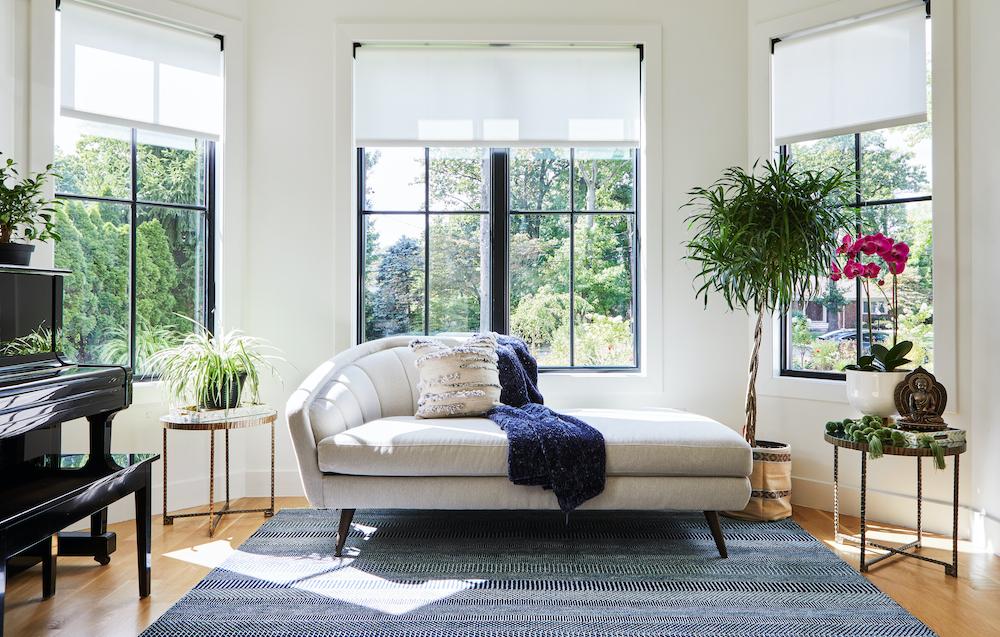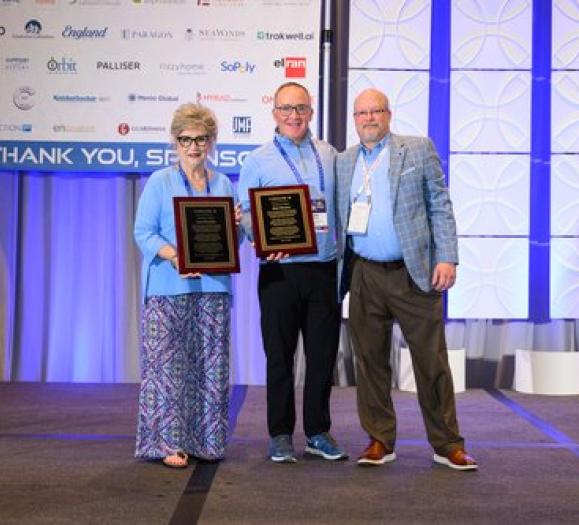For retailers and designers, keeping their clients happy comes down to reliability: ticking off the boxes as the design process moves forward, and delivering a final finished space, furnishings and details. COVID-19 has magnified the need for reliable and often quicker lead times and deliveries, as many consumers want spaces designed yesterday and have adopted an Amazon-effect mentality with next-day delivery expectations.
Retailers and designers are busy; home furnishings manufacturers say orders are coming in from all sides. The challenge is having product stocked and ready to ship as demand soars and coronavirus continues to disrupt global supply chains across the home furnishings industry. Is this an opportunity to have the Made in the U.S. message reverberate across the furniture, lighting and decor categories? Some think so.
‘When’ the Client Wants
One of the more critical aspects in service businesses where product procurement is key is managing client expectations. According to designers and retailers, those they are working with are willing to wait a reasonable amount of time as long as that new sofa/desk/task light and more arrive on schedule.
Sourcing overseas during this coronavirus pandemic has made that less reliable as supply chains are disrupted. And while early pandemic shutdowns had slowed production at U.S. home furnishings manufacturers as well, the timeline for product delivery has still been easier to track, even if those lead times have gotten a little longer. In general, domestic manufacturing has the ability to be more nimble with its delivery lead times.
“We promise [our clients] we have this arriving,” says Laurence Carr, founder of Laurence Carr Design, in New York. “And we’ve been promised that pieces are reserved for us.” Somehow they are being delivered to someone else, she says, or they don’t arrive at all. “We’re doing our best, the reps are doing their best; we can complete drawings and construction and address the little things …” However, if the furniture or lighting is not arriving, jobs can’t be completed and designers risk clients being disappointed. “That’s the difficult part,” she says.
Carrie Fusella, founder of Design Alternatives Inc., in New Jersey, shares that she also sources in the U.S. as much as possible. Much of her work is commercial — hotels, senior communities and health care — so price is an important factor in her purchases. “We have to watch our prices, but if I can source domestically, I have more confidence,” she says. “Even if it’s a little bit more expensive, it’s worth it.”
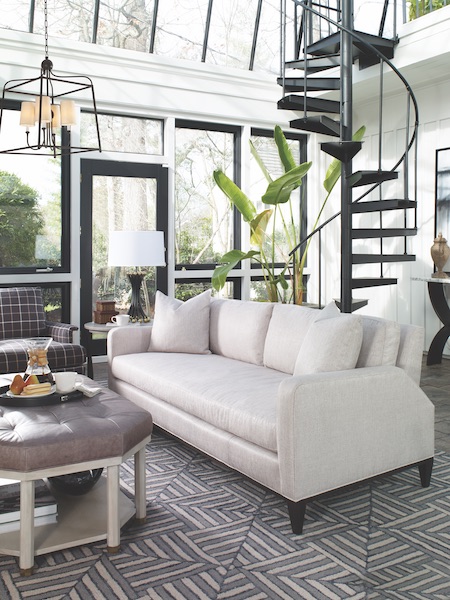
“It creates frustration for the consumer,” Libby Langdon, founder of Libby Langdon Interiors, in New York, says of unpredictable delivery times. Langdon has several licensed product lines — American-made furniture with Fairfield Chair, and artwork with Paragon, made in Alabama. She says of her Fairfield collaboration, “So much of my collection with Fairfield is made in North Carolina. It cuts down on shipping, and we are working on a quick ship program as well. We’re living in an age where the consumer wants it yesterday, so made in the U.S. has an advantage. It gives us confidence that the delivery timeframe is reliable.”
Out on the West Coast, for Encinitas, CA’s Black Whale Home, supply chain issues have only recently started to have an impact, says owner Kirsten Recce. The lighting-retailer-turned-whole-home-showroom began expanding her 7,500-square-foot space into furniture and decor just before coronavirus hit, she says. “Many of our lighting manufacturers who order in from China had been well-stocked,” she said, but in the last month or so, that seems to be changing. “We’ve been told they anticipate this will continue for another six weeks or so.” The issue goes beyond getting product across the ocean, she adds. Getting the products processed once here has presented challenges as well, on docks and in warehouses, where there has been limited personnel.
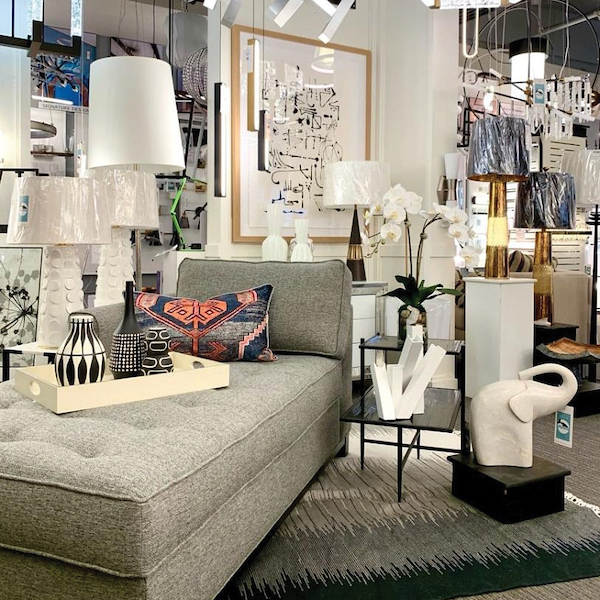
While that same issue has affected some domestic manufacturing, particularly in light of earlier shutdowns, they’ve been able to come back online more quickly.
“We are seeing a swing back to Made in the U.S.,” Recce continues. “It’s not as much about getting the product faster, necessarily, but more about clarity as to when the product will arrive. When something is coming in from China, I don’t have an arrival date until it’s on the water, and even then it can change.” With her suppliers who have manufacturing capabilities here, she has a reliable delivery date.
Have It Your Way
As Recce has expanded her showroom to incorporate custom furniture — a category she says is lacking in her region — she chose to partner with Norwalk Furniture, in Ohio, in part because she has confidence in the lead times, even for custom pieces.
Recce continues that even before coronavirus, U.S.-made home furnishings and lighting have been best sellers in her retail showroom. Her best-selling lighting comes from Hubbardton Forge, also made to order, and the recently added Norwalk collection resonates with her customers. “Some people love the idea of customization. There’s that person who totally gets ‘it is just being made for me,’” she says.
With her Fairfield collection, Langdon offers customization options as well. “We’ve tried to make it easy in case they are overwhelmed by the options,” she says. “The sky is the limit though. One of the best things a designer can offer is a space that is outside of that standard, big-box retail look.”
54 Pairs of Hands
Another story Langdon loves to tell about her Fairfield collection and her artwork with Paragon is the artisan story. It’s a short trip to visit the factories and “kick the tires” and have tweaks made on the spot. In her factory visits, however, she’s also come to appreciate the number of artisans and the craftsmanship that goes into each piece. “How many hands touch one piece of furniture before it shows up at your house?” she ponders. “There are people who are gainfully employed because furniture is made in America. Since the pandemic, made in America has a different connotation and importance.”
The quality and customer service of American-made delivers as well, Langdon adds. “If something is damaged, the turnaround time is night and day. Customer service is more important than ever before. It’s the one-two winning combination of value and great quality. Manufacturers who are telling that story are winning right now.”
Black Whale Home’s Recce agrees. “There is quality and craftsmanship built into that one piece of furniture,” she says of her Norwalk line. “Fifty-four pairs of American worker hands make that piece. Those are impactful stories.” Along with the quality, customer service is key. Hubbardton Forge lighting, for example, is Black Whale’s best-selling line, in part because the company offers a lifetime warranty on its products. “That lifetime warranty is a huge feature for us. I don’t know of any non-U.S. companies that offer that. We’ve had so few failures, but that warranty doubles our sales.”
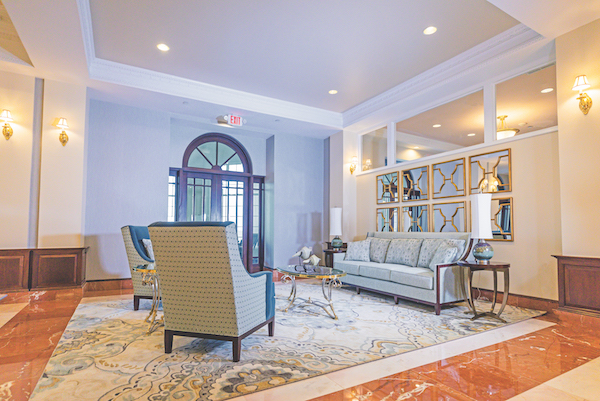
“If we order from overseas, it’s really hard to find replacement parts,” adds Fusella. And if something comes in incorrectly, such as the pitch of a chair for a senior center, getting adjustments made is much easier with a domestic manufacturer. “I go domestic as much as I can. If something does have to be repaired, they have the means to do it here,” she says.
Saving the Planet
Especially in California, Recce adds, consumers are sustainably conscious. Furniture made in the U.S. speaks to that consumer as well. “We need to re-educate the public about purchasing investment products for their homes,” Recce says. “If we really want to take saving the planet seriously, we need to think about buying less and buying better. If we all want to do our part to save the planet, what’s most impactful is what we are sending to the landfill,” she adds. It’s important to tell the quality story of these American-made home furnishings to help the consumer understand that.
Carr, whose design centers around sustainability and wellness, agrees that local sourcing has a positive impact on the environment. “We suggest local brands and source as close to home as possible,” she says. “We are more careful now because of what shipping takes out of the earth.”
Whether sustainability, shipping times, quality or customizability, at the end of the day for these designers and retailers, meeting client expectations is the most important aspect of the job. In current times, and others, products sourced in the United States hit key benchmarks that can help achieve that.



